Don't wanna be here? Send us removal request.
Text
Study tip #1
Read, memorise, then write it in your own words. To elaborate:
Read the text or the power point, even if it’s a paragraph/slide at a time. Then, write it in your own words, trying to use your memory only. This way you’re basically doing ‘copy & paste’ straight into your brain.
11 notes
·
View notes
Text
100 days of productivity
I’m gonna try a new thing in the new year, where I’m productive for 100 days in a row, with no procrastinating or wasting any time on unnecessary things. My productive things include reading, crocheting, gym, my story and my school work.
I’m gonna be time-blocking on Google calandres to see if there’s any time that I’m still wasting.
Feel free to join me!

#studying#study motivation#noprocrastinating#productivity#100daysofproductivity#studyblr#bullet journal
5 notes
·
View notes
Photo
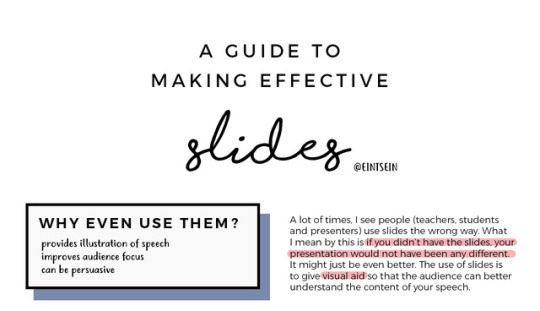








A GUIDE TO MAKING EFFECTIVE SLIDES aka how to create presentation slides that actually improve your presentation
By Eintsein
(apologies for the variation in image quality. idk what went wrong with tumblr)
38K notes
·
View notes
Photo



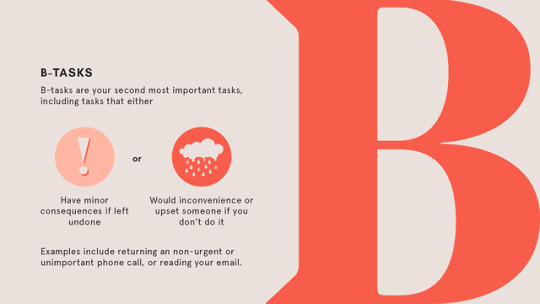

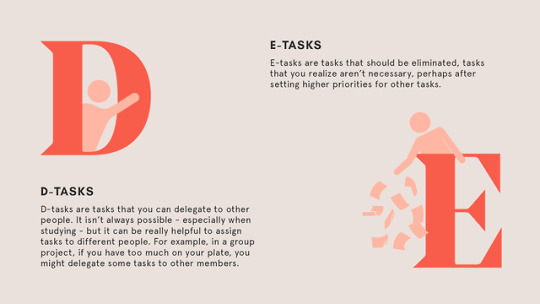

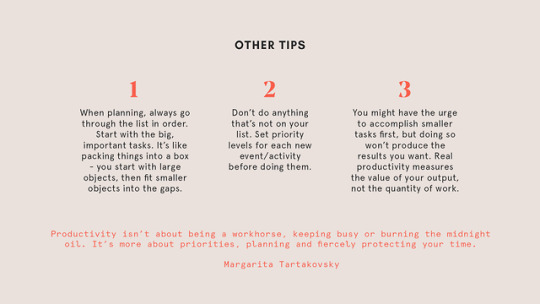

The ABCDE Method: Accomplish Tasks more Efficiently
I recently came across the ABCDE method that’s similar to what I do to stay productive each day: instead of lumping up all your tasks, sort them into categories and tackle each of them differently. Here’s an outline of the method. Hope it helps :)
16K notes
·
View notes
Text

An outside study session after a lot a drinking yesterday. It’s very much a relaxed pamper day, with lots of sport science revision
6 notes
·
View notes
Text
so I got into grad school today with my shitty 2.8 gpa and the moral of the story is reblog those good luck posts for the love of god
1M notes
·
View notes
Text
i wrote half an essay in 20mins today when it’s not even due for another 4 weeks, reblog this to have a productivity lightning bolt strike you like it did me today
160K notes
·
View notes
Text
Revision idea
I have exams in a week, and the way I’m revising is using flash cards and another method that I can’t remember the name of.
Pick a colour for the topic you’re writing about, and write what you’re putting on the flash card on one side
Read the information for the other side of the card. Memories it, and write it down in your own words. Look at the information again if you forget
Do this for all the information you need to remember for your exams, end of term/year test, or quizzes.
When all the information is down, go through your cards, read the back, try and answer and question, then put them into 3 piles - really understand, sorta understand, don’t understand.
Look through ‘don’t understand’ pile once a day, the ‘sorta understand’ pile every few days, and the ‘really understand’ pile once a week
If you know the names of these, please let me know. And I hope these really help you through your exams. You can use these from the beginning of the year too.
4 notes
·
View notes
Text
how to study for a subject when you feel burnt out by it 🌱✨🌻
take initiative - when you’re starting to enjoy a subject less, whether it’s because of the teaching, amount of content or simply not liking specific areas of content, take the subject outside of the classroom and determine what it is you don’t like and how to rectify it
teach yourself - teaching isn’t always going to be perfect. in one of my history classes, we learn entirely from copying the textbook onto worksheets, which i find tough because it’s not the way i like to learn. start going over the content in a way that you find fun and beneficial - it’s a good way to revise information that you already know and fill in gaps you might not have known were there!
research into the subject/topic - sometimes learning straight from the specification can be tiring, and finding something unique and interesting about a topic can be a good way to spark inspiration and motivation to learn something you don’t enjoy. if you have an interest in what you learn, you’re more likely to remember it, and further research can also aid your learning by taking your knowledge further!
make your own resources - i find that when i’m doing something i don’t feel interested in, my organisation and productivity in that area goes downhill. i put in less effort so i don’t make as many notes, and i have less to revise from in future. it might be helpful to take that information and put it into a form that will benefit you and your preferred learning style, whether it be cute and elaborate notes, flash cards, putting it into quizlet, mind maps, etc.
don’t be afraid to ask for help - dissatisfaction in a subject is often caused by a lack of understanding in it. if you’re struggling, ask people in your class or your teachers/professors. they’re there to help you, as scary as asking for help seems. admitting you find something hard is a strength, not a weakness.
2K notes
·
View notes
Text
my favorite random study tools
1. quizlet games. the gravity game on quizlet literally saved my german grade lol
2. white boards. i do all my math practice on these and it makes it not only easier to do the practice but way more fun!
3. youtube. youtube really pulls through when you don’t fully understand a concept based on how your teacher explained it. there are probably thousands of videos explaining any topic you can think of- odds are one of them will help you out!
4. ted talks. this isn’t exactly a study tool, but there are tons of ted talks that explain ways you can study/retain information. i highly recommend them!
5. act like you already have your dream job. do you want to be a journalist? act like you’re reporting on a major story when you’re writing an english essay. apply the same logic to any class/job. it makes studying more fun!!
6. podcasts. find a podcast on a topic for your class and give it a listen. they’re great because you can listen to them any time- when you’re walking to class, in the shower, while you’re doing other studying… just having it on will help you subconsciously absorb the information!
7. diy study guides. did your teacher not make a study guide for a test? make your own! go through all your notes for the unit and put all the important information into one document. this way you’ll have a one stop shop when you go to study for the test!
thanks for reading! x
3K notes
·
View notes
Text
Organisation
There are so many ways to be and remain organised, but its just a matter of finding the way that suits you. So below I will have a list of ways to stay organised in the coming months.
1) Get a planner - There are so many different types of planner, such as the happy planner, an everyday diary, a notebook, a bullet journal. The list is endless. In the planner, write down everything that you need to do either that day or month, however you are planning to do it.
2) Find your way - As mentioned above, once you have your planner, you need to find out how you will plan yourself. Will you do daily tasks, weekly tasks, monthly tasks? Should you make trackers to make sure you’re doing what you need or want to do everyday? Think about how you want this to be done.
3) Make a key - Now this is super optional, more relevant if you’re making a bullet journal. But as I like to do it, I have a key for tasks, started tasks, completed tasks, moved tasks and cancelled tasks. There is also one for events, things that don’t get started, just done straight away. But you can also make it colour coded, for school, personal, business, family etc. The list is endless.
4) To-Do lists - I feel like this is the most obvious point. It doesn’t matter if you write a big one on a post-it note, then transfer it to the relevent days in your planner. Or you can just put it straight in. Either way, just write it down. Once its written down you’ll be so much less stressed, having a nagging thought in the back of your head that you need to do this, and need to do that. It just makes getting through the day or month so much easier.
5) Plan ahead - Last but not least, plan as much as you can to make life easier. Plan your meals, plan your clothes for the next day, PLAN the next day. This once again will get so much stuff off your mind, and help you rest easy... well easier, because.. ya know... life...
I hope these tips - although they are few - help you out. I did all of these myself, and now it makes life so much easier. I now know what areas I need to revise before any tests, and can be more aware when anything important coming up.
#study#organisation#planning#motivation#organised life#life is good#study motivation#studyblr#get organised#notes#note taking#studying
0 notes
Photo

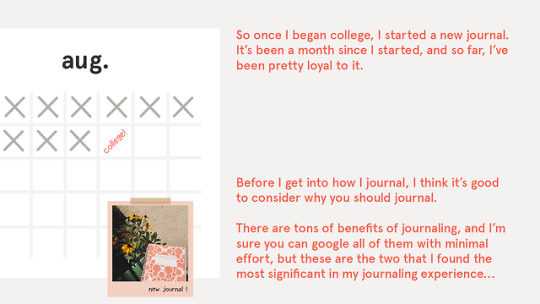

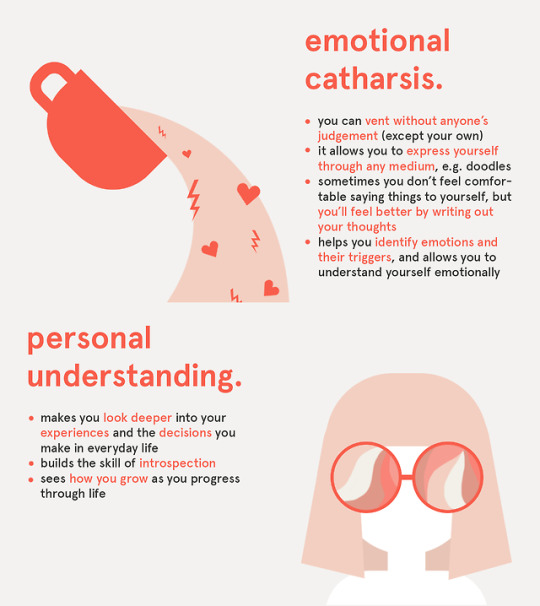


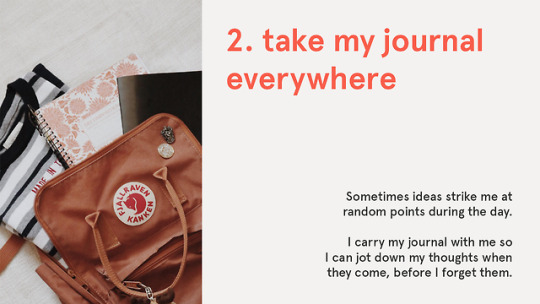

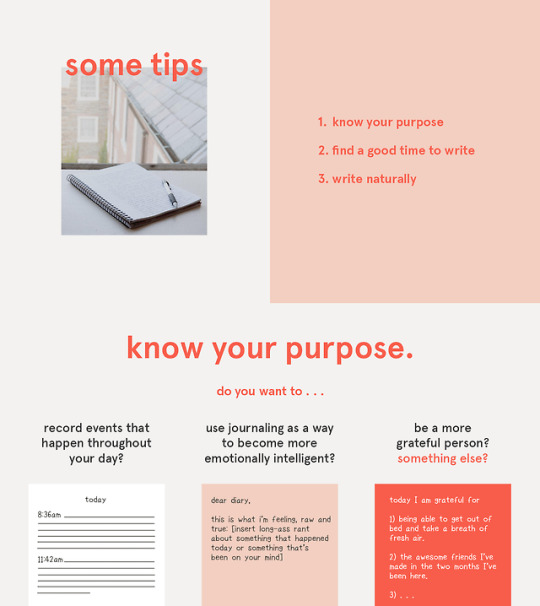
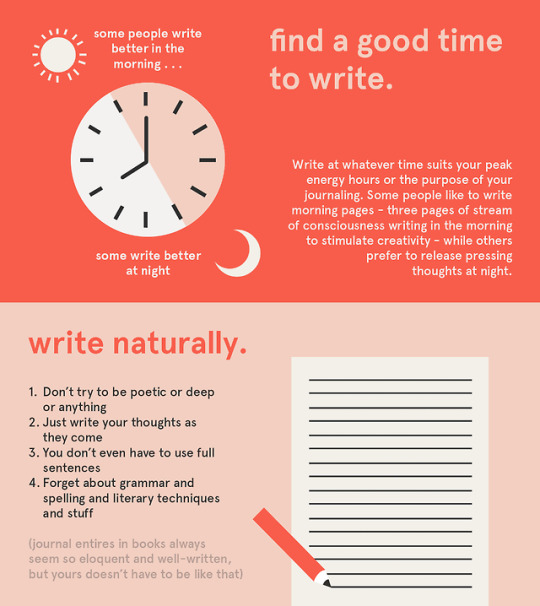
A Small Guide to Journaling by Eintsein
Something you may or may not know about be is that I journal. However, only recently have I gotten the hang of it and stayed loyal to the habit of journaling. Here are some tips and tricks on how you can journal successfully. Hope you like it :)
30K notes
·
View notes
Text
Anything worth doing is worth doing poorly. Because doing it poorly is better than not doing it at all
2 notes
·
View notes
Text
Prioritising
I often struggle to work out which of my work I need to do ASAP, and which I have a little time to complete. My work load this half term includes:
3 topic papers
1 business essay
1 French sheet
1 btec 40 page worksheet
And because if this, and the fact I’ve got 4 days left, has made me really need to prioritise. So I decided to put together the steps I’ll be using and some other tips and tricks.
My steps:
First off, date when everything is due. Number 1 - 3 is due the first day back, number 4 is due in March. This means I can leave #4 until everything else is done.
Punishments - my teacher for #1 is more likely to tell my off if i don’t complete my work, so they are my first priority. My business teacher will want the work whenever, and my French teacher will just be disappointed. However, as you may know, doing a big bulk of work can get boring. That leads to step 3.
Break down your workload. I will now do half a topic paper, one activity on my French sheet, and a paragraph of business. I will repeat that until I’ve finished all.
Don’t forget everything else. I’m in year 13, which is exam/finals year before university. I need to revise daily, make notes of all my syllabus if I haven’t already, and overall get better and remembering things. So during my day, I need to find time to add these in.
I hope this helped. You can do this in either a brain bump in your bujo, or on a post it note, or anywhere.
Other tips and tricks
To-do lists - use the above steps in a to-do list, with the satisfaction of crossing off all the tasks
Start with the hard tasks and get easier, or the other way around depending on your mindset
Get a planner
Enjoy and I’ll see you next time - uno.bujo
10 notes
·
View notes
Text

030220189 - Some of my notes for the day. I’m struggling to find the way to make notes the suits me.
1 note
·
View note
Photo

Properly managing your time is a skill that every successful student needs. In today’s post, I’ll be sharing ten of my most effective time management strategies. Let’s go!
1. DEVELOP THE RIGHT MINDSET
First things first, get rid of the “I just don’t have enough time” mindset. Managing your time starts with taking responsibility for conquering the challenges in your life instead of giving up and resigning yourself to accept less-than-ideal amounts of sleep and/or study. In the following activity, I’ll show you that there is absolutely a way to fit rigorous studying into a balanced schedule.
There are 168 hours in a week. Let’s see how that time might be spent:
40 hours at school (8 hours x 5 days) (**Post-high school students will likely only spend 12-18 hours in lectures every week!)
56 hours sleeping (8 hours x 7 days)
14 hours eating, bathing, etc (2 hours x 7 days)
21 hours socializing, extracurricular activities, etc (3 hours x 7 days)
5 hours commuting (30 minutes each way x 5 days) (**See Tip #10 to learn how you can make this time productive!)
3 hours exercising (30 minutes x 6 days)
Add all that time together and you get a maximum of 139 hours spent on all of the essential components of a healthy, balanced life– regular exercise, a full 8 hours of sleep per night, plenty of time for socialization and hobbies, and so on.
But that still leaves 29 hours of your week remaining, which is the equivalent of a part-time job! Nearly thirty hours a week is more than enough time to finish your homework and studying, guaranteed.
So recognize that there are indeed enough hours in the day to get everything done while maintaining your sanity! Developing this mindset will empower you to take control of the way you spend those remaining 29 hours. Make sure to check in with yourself often. Be mindful of how you’re spending your time, and regularly reevaluate to see if you’re on track to hit your goals.
2. PLAN THE NIGHT BEFORE
Each day, invest a few minutes in planning to save yourself hours in execution. While you don’t necessarily have to do this at night, I find that planning the next day right before I go to bed helps me to clear my mind, sleep better, and wake up with a purpose so I can hit the ground running in the morning. Pack your bag, set out tomorrow’s outfit and/or gym clothes, and make a few preparations for breakfast. Then, take a moment to assess the day you’ve just had. What went well? Where could you have made better use of your time? Were there any tasks you didn’t get to that have to be finished tomorrow? Using your mental reflection along with the rest of the tips in this post, create a schedule or a to-do list for the next day.
3. PRIORITIZE
Once you’ve made a list of everything you need/want to get done, sort them by priority to help you direct your focus towards the right tasks. For students with academic obligations, there are three main ways to prioritize tasks:
Urgency: Check the due dates for your assignments and prioritize those that are due the soonest. Study for tomorrow’s test before you practice for next week’s presentation.
Significance: Prioritize assignments that make up a higher percentage of your class grade. If your English homework is worth 5% of your grade but the essay is worth 50%, place a higher priority on the essay.
Potential consequences: Let’s say, for example, that you will most likely end up with a B in science– you have an 83% in the class, your test scores have been Bs throughout the year, and it’s unlikely you’ll score high enough on the final exam to end up with an A average. But maybe in history class, you’re hovering at the edge between a B and an A, and if you study hard for the final exam, chances are good that you can knock your class grade up to an A. In this case, any amount of effort spent on the science final will probably result in a B grade, whereas studying for the history final could put you up an entire letter grade. Therefore you should prioritize studying for your history final over studying for your science final.
4. GO STEADY
While you should knock out your prioritized tasks as soon as possible, also try to work on something that is important, but not urgent, every day. Start on an essay that’s not due for another month. Review your flashcards daily so you’re not scrambling to cram the night before the test. This also applies to activities outside of school; I, for example, make an effort to write a bit of a blog post daily in addition to completing my homework assignments.
Making steady progress on long-term projects will prevent you from getting stuck always rushing to finish urgent tasks (“putting out fires”).
5. BREAK IT UP
When writing your to-do list or creating a schedule (more on that later), break up your assignments and projects into small, actionable steps to make them more manageable. Avoid vague words such as study, work on, or practice when creating the actionable steps. Otherwise, you’ll drift aimlessly through your work with no clear guidelines as to what exactly you need to do or when to stop. Here are some examples of how you might break up your assignments:
study for trig test –> watch lecture on module 4.7, complete review problems 15-35, drill unit circle flashcards 2 times through
work on history research –> find 3 primary sources from library archives, annotate article 1, annotate article 2, annotate article 3, brainstorm possible thesis statements
practice French –> complete demonstratives lesson on Duolingo, drill Anki deck 3 times, write 10 orignal sentences using new vocab
6. EAT THAT FROG
This tip comes from author Brian Tracy, who was inspired by the following Mark Twain quote:
If it’s your job to eat a frog, it’s best to do it first thing in the morning. And if it’s your job to eat two frogs, it’s best to eat the biggest one first.
This means that you should work on your most dreaded task first, when your energy and motivation levels are highest. Your frog doesn’t necessarily have to be the hardest task, just the one you’re looking forward to the least.
Don’t sit there looking at the frog and cringing. Just eat it. Take action. If you can get the most horrible assignment out of the way first thing in the morning, the rest of your to-do list is downhill from there!
7. USE ENERGY-BASED TASK MANAGEMENT
On a similar note, it’s a good idea to plan your entire day around your energy levels, not just the frog. I call this technique energy-based task management, and it can be summarized in three simple steps:
Determine which time(s) of day you have the most energy. Are you a morning bird? A night owl? Do you hit a slump after lunch?
During your high-energy times, work on the difficult, thought-intensive tasks such as brainstorming, writing, annotating, and active studying.
During your low-energy times, take care of the menial things that have to get done but don’t require a lot of energy, attention, or skill. This includes tasks such as creating flashcards, cleaning the house, exercising, and running errands.
Energy-based task management helps you make the most out of your energy potential instead of wasting your peak productivity times on easy, mindless tasks.
Click here to read my full post on energy-based task management!
8. BOX YOUR TIME
If you’re someone who needs a bit more structure than a simple to-do list can provide, timeboxing may be exactly what you need! Timeboxing is simply allotting tasks to certain periods of time. I’d recommend using a digital task manager to do this (Plan is my tool of choice), but you can also use a table or spiraldex.
Here are some guidelines for using timeboxing to schedule your day:
Schedule your fixed times first. These are all of the events you’ve already committed to, such as appointments and rehearsals. It also includes the absolute essentials such as times for sleeping, eating, and taking breaks.
Use your priorities (Tip #3), frog (Tip #6), important-but-not-urgent task (Tip #4), and general planner/calendar to create a rough list of things you need/want to get done the next day.
Estimate how much time each task will take you. When starting out, you are likely to actually need more time for tasks than you estimated, so add some wiggle room to prevent throwing off your entire schedule. As your estimates become more accurate, try scheduling slightly less time than you think you need in order to challenge yourself to get things done more quickly.
Use energy-based task management (Tip #7) to place high- and low- energy tasks in their respective places on your schedule.
Batch tasks whenever possible. Group similar items together so you’re not constantly switching between unrelated things.
Schedule your downtime. Putting fun activities on your schedule will motivate you to stick with the plan and get your work done faster.
Timeboxing is such a big topic that I’ll most likely make an entirely separate post about how I timebox, so stay tuned for that!
9. LEARN TO SAY NO
However tempting it may be, don’t take on every opportunity that arises. Don’t let others pressure you into signing up to take all the hardest classes and joining a gazillion extracurriculars. Turn down parties and social obligations with people who are negative, draining, or simply incompatible with you. Reject activities that don’t bring you real happiness, such as TV, social media, or games on your phone. Watching your favorite show is a great way to unwind, but consider if your time spent scrolling half-heartedly through Instagram could be better spent hanging out with friends.
Know when to stop working. Particularly when it comes to organizing and other mindless tasks. Your supplies are never going to be 100% neat and your notes won’t be perfectly pretty. Let go of perfectionism. In my experience, the amount of studying required increases exponentially as your goal grade rises. While I always believe in working hard, the blunt truth is that at a certain point, straining yourself to get a certain score makes no difference. So don’t spend 10 hours studying to get a 100% if you can spend 5 hours to get a 95%. And learn to settle for “good enough.”
10. FILL THE GAPS
Look for little gaps of time throughout the day during which you can work on tiny tasks.
Take advantage of:
downtime at the end of class
breaks between classes
waiting in line/in a waiting room
workouts on a treadmill, elliptical, stationary bike, or similar
commute time (if you’re driving, please be careful to focus on the road!)
The above are great times to:
start doing homework
drill flashcards
brainstorm new goals or ideas
listen to recorded lectures
listen to an audiobook or podcast
check/edit a completed assignment
update your planner
mentally rehearse a presentation
read a bit of an easy text
You can also put some homework in a clipboard and carry it around, filling out a bit whenever you get the chance.
A few minutes here and there may not seem like much. But even doing a couple homework problems at the end of class will make it easier to finish the rest when you get home, since you’ve already started. Plus, since the time quickly adds up but seems short and spread out, you can get a lot of work done without feeling like you’ve done any.
That’s all for today! I’ve got lots more advice to share, but hopefully these ten tips will send you on your way to becoming a time-management ninja!
Thanks for reading! All of my reader interactions and personalized advice can be found on my Tumblr. If you have questions, feedback, or post requests, feel free to drop a Tumblr ask or contact me.
+Click here for the rest of my original reference posts!
—Sophia
5K notes
·
View notes
Text
Get the best out of your time
Entire days sometimes roll by without us noticing. Sometimes we procrastinate through all day. Here are a few tips how to use your time better:
Track the use of your time -Try this for at least a week. Write down, in any way you want, how did you spent your day. When did you study? How long did you spend cleaning your room? When did you procrastinate? This will help you find the times of day when you procrastinate and which you could use better.
Make schedules for especially busy days
Eliminate procrastination triggers -Put your phone away. Turn off your computer unless you truly need it for work.
Take breaks -I said it milion times and I’ll say it again.
Use every minute -20 minutes between classes? Do the small simple homework. 30 minute walk home? Listen to audio books.
Every task counts -Being productive isn’t only studying/working. It’s cleaning, self care and hobbies too. Keep that in mind.
Start on 3 -I use this method of counting to 3 when I really don’t want to do something. Just count to three and go. Get up and do it. Don’t give your brain a chance to stop you.
Enough sleep, enough energy
Here you go! That’s all my knowledge. Have an amazing day!
2K notes
·
View notes